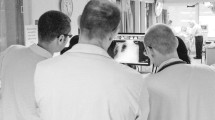Abstract
This paper explains some of the routine of grand rounds in a major Israeli teaching hospital. It focuses on paradoxical behavior of physicians and others who participate in grand rounds. Behaviors are explained as boundary marking mechanisms meant to redefine statuses in the hospital and defend the physician from threats to his status. These paradoxical behaviors also function to permit the physician to enter and depart from the more culturally marginal territories of human experience, those which people try to deny or mask in everyday life. In particular, paradoxical behavior arises when dealing with death, waste, and sex. Paradoxical behavior is seen as a means of making a space in which everyday reality is masked and turned into play, creating a boundary between the medical reality and the social world. Paradox and other aspects of the grand rounds serve to restratify and counteract structural breakdown created by the physician's entry into states of pollution.
Similar content being viewed by others
References
Annas, G.J. 1974 The Hospital: A Human Rights Wasteland. Civil Liberties Review, Vol. 1.
Anspach, R. 1988 Notes on The Sociology of Medical Discourse: The Language of Case Presentation. Journal of Health & Social Behavior 29:357–375.
Arluke, A. 1980 Roundsmanship: Inherent Control on a Medical Teaching Ward. Social Science and Medicine 14A:297–302.
Becker, H.S., B. Geer, E.C. Hughes and A.L. Strauss 1961 Boys in White: Student Culture in Medical School. New Brunswick: Transaction Books.
Blauner, R. 1966 Death and Social Structure. Psychiatry 29:378–394.
Brown, R. and A. Gilman 1960 The Pronouns of Power and Solidarity.In Style in Language, T.A. Sebeok, ed. Pp. 253–76. Cambridge, Mass: MIT Press.
Burson-Tolpin, Ann 1989 Fracturing the Language of Biomedicine: The Speech Play of U.S. Physicians. Medical Anthropological Quarterly N.S. 3,3:283–293.
Bouthis, R.Y., S. Roth, and G. MacQueen 1989 Communication in the Hospital Setting: A Survey of Medical and Everyday Language Use Amongst Patients, Nurses and Doctors. Social Science and Medicine 28:4.
Davis, S. 1984 Good People Doing Dirty Work: A Study of Social Isolation. Symbolic Interaction 7:233–247.
Douglas, M. 1973 Natural Symbols. New York: Pantheon Books.
— 1975 Implicit Meanings. London: Routledge and Kegan Paul.
— 1988 Purity and Danger 4th edition. London: Routledge and Kegan Paul.
Emerson, J. 1970 Behavior in Private Places: Sustaining Definitions of Reality in Gynecological Examinations.In H.P. Dreitzel (ed.). Recent Sociology 2:74–97. New York: Macmillan.
Erickson, F. 1987 Topic Control and Person Control: A Thorny Problem for Foreign Physicians in Interaction with American Patients. Discourse Processes 10:401–415.
Friedson, E. 1970 Professions of Medicine. New York: Dodd Mead.
Glick, S. 1985 Symposium on Patients' Rights. Ben-Gurion University Medical School (in Hebrew).
Goffman, E. 1957 Characteristics of Total Institutions. Symposium on Preventive and Social Psychiatry, Washington D.C.: Walter Reed Army Institute of Research.
Good, M-J.D. 1991 The Practice of Biomedicine and the Discourse on Hope: A Preliminary Investigation into the culture of American Oncology.In Anthropologies of Medicine: A Colloquium on West European and North American Perspectives. B. Pfleiderer and G. Bibeau, eds., Heidelberg, Germany: Gieweg.
Gordon, D.R. 1990 Embodying Illness, Embodying Cancer. Culture, Medicine and Psychiatry 14:275–297.
Gross, E. 1986 The Social Construction of Events Through Public Dramas. Symbolic Interaction 9:2 179–200.
Habermas, J. 1970 Technology and Science as Ideology.In Toward a Rational Society. Boston: Beacon.
Hughes, E.C. 1964 Good People and Dirty Work.In Howard Becker (ed.). The Other Side. New York: Free Press.
Lock, M. and D. Gordon (Eds.) 1988 Biomedicine Examined. Dordrecht, The Netherlands: Kluwer Academic Publishers.
Loudon, J.B. 1977 On Body Products.In J. Blacking (ed.). The Anthropology of the Body. London: Academic Press.
Marriott, M. 1976 Hindu Transactions: Diversity without Dualism.In Kapferer, B. (ed), Transactions and Meaning. Institute for the Studies, of Human Issues, Philadelphia, pp. 109–42.
Osterlund, H. 1983 Humour: A Serious Approach to Patient Care. Nursing 13(12):46–47.
Rawlings, B. 1989 Coming Clean: The Symbolic Use of Clinical Hygiene in a Hospital Sterilizing Unit. Sociology of Health and Illness 11:3 279–293.
Rhodes, L.A. 1983 Laughter and Suffering: Sinhalese Interpretation of the Use of Ritual Humour. Social Science and Medicine 17(14):979–984.
Rosenheim, E. 1974 Psychotherapy: An Interactive Experience. American Journal of Psychotherapy 28:4 584–591.
Shuval, J.T. 1992 Social Dimensions of Health: The Israel Experience. NY: Praeger (in press).
Simons, R.J., R.G. Baily and C.W. Zwillich 1989 The Physiologic and Psychological Effects of Bedtime Presentation. New England Journal of Medicine 321(18):1273–75.
Stone, G.P. 1962 Appearance and the Self.In A.M. Rose (ed.). Human Behaviour and Social Process. Boston: Houghton-Miflin Co.
Travers, A. 1982 Ritual Power in Interaction. Symbolic Interaction 5:277–286.
Warner, U. 1984 The Serious Import of Humour in Health Visiting. The Journal of Advanced Nursing 9(1):83–87.
Weiss, M. 1988 The Metaphor of AIDS. Presented at the 19th meetings of The Israel Sociological Assn. Ben Gurion University.
Weiss, M. 1990a Theater in the Medical Context: the Case of Bedside Rounds. Presented at the 21st meetings of The Israel Sociological Assn. Bar Ilan University.
Weiss, M. 1990b Uncertainty in Grand Rounds. Presented at the 21st meetings of The Israel Sociological Assn. Bar Ilan University.
Author information
Authors and Affiliations
Rights and permissions
About this article
Cite this article
Weiss, M. Bedside manners: Paradoxes of physician behavior in grand rounds. Cult Med Psych 17, 235–253 (1993). https://doi.org/10.1007/BF01379327
Issue Date:
DOI: https://doi.org/10.1007/BF01379327



